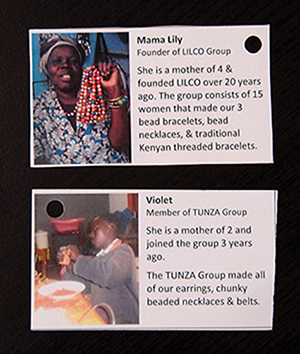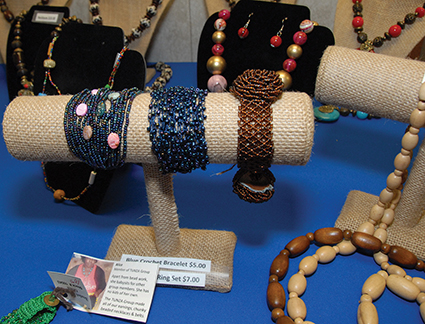 Each piece of jewelry comes with a card with a picture of a Kenyan woman working on the pieces. The card gives the woman’s name and tells a little bit about her.PLAINVIEW—Visitors to the office suite in Wayland Baptist University’s School of Business immediately see a table filled with colorful beaded and woven necklaces, earrings and bracelets. A card attached to each piece of jewelry pictures a Kenyan woman hard at work, identified by name and a description of what she is doing.
Each piece of jewelry comes with a card with a picture of a Kenyan woman working on the pieces. The card gives the woman’s name and tells a little bit about her.PLAINVIEW—Visitors to the office suite in Wayland Baptist University’s School of Business immediately see a table filled with colorful beaded and woven necklaces, earrings and bracelets. A card attached to each piece of jewelry pictures a Kenyan woman hard at work, identified by name and a description of what she is doing.
For the past year, Enactus, Wayland’s student entrepreneurial group, has sold handmade jewelry from Kenya to raise funds for trips to Africa, as well as providing additional income for women who produce the inventory.
Offering entrepreneurial training
But what ended as a fundraising opportunity for students began as a teaching and service opportunity nearly two years ago, when a Wayland group traveled to Kenya to offer basic entrepreneurial training.
Barry Evans, dean of the School of Business, explained the unemployment rate among women actively seeking jobs in Kenya is more than 48 percent. Many people who want to work or start their own businesses simply don’t know where to begin.
Enactus sought to use what the students had learned and present it to potential entrepreneurs in Kenya to help them develop businesses to improve their livelihood.
 Jessica Echols, a senior at Wayland Baptist University, was among the group of Enactus students who helped set up the Kenya jewelry fundraiser at Wayland. The fundraising effort partners directly with small businesses in Kenya, benefitting not only Wayland students, but also the women working in jewelry making groups.“We went over there to do entrepreneurial training,” said Jessica Echols, who graduated Dec. 12 with a degree in business administration. “We really put an emphasis on marketing. From what we were told, that was a major concept that they didn’t understand. But we also did finance, accounting, management and different things like that.”
Jessica Echols, a senior at Wayland Baptist University, was among the group of Enactus students who helped set up the Kenya jewelry fundraiser at Wayland. The fundraising effort partners directly with small businesses in Kenya, benefitting not only Wayland students, but also the women working in jewelry making groups.“We went over there to do entrepreneurial training,” said Jessica Echols, who graduated Dec. 12 with a degree in business administration. “We really put an emphasis on marketing. From what we were told, that was a major concept that they didn’t understand. But we also did finance, accounting, management and different things like that.”
Students met with the people and divided them into small groups with similar interests, such as agriculture or other areas of commerce. Wayland students worked with these groups to help set up business plans and teach the Kenyans how to look at finances and evaluate the cost of production to determine what to charge.
In small villages outside Nairobi, tourists can purchase jewelry at markets. A middle-man typically asks what people are seeking, collects the inventory and sells it to the interested party, pocketing most of the money and returning a few dollars to the artisans who made it. Some of those manufacturers are groups of women who string beads and produce jewelry in an attempt to earn enough money to put food on the table for their families.
Sign up for our weekly edition and get all our headlines in your inbox on Thursdays
Cut out the middle-man
One student returned from the initial trip with some handmade jewelry. Evans wondered if the Wayland students could work directly with these groups of women to raise funds for future trips.
 “I thought a better way to do it would be to contract directly with the women who make the jewelry,” said Evans, who was familiar with the market system used in Kenya. “The middle-man in that system was the one who pretty much made all the money. It didn’t really help solve any problems rather than provide a few meals for them.”
“I thought a better way to do it would be to contract directly with the women who make the jewelry,” said Evans, who was familiar with the market system used in Kenya. “The middle-man in that system was the one who pretty much made all the money. It didn’t really help solve any problems rather than provide a few meals for them.”
Gilbert Werema, an online marketing professor for the School of Business, has a sister who lives in Kenya. She helped contact the groups and set up the direct line through which Evans was able to order merchandise.
‘Life-changing for the women’
Evans and the students viewed samples of the jewelry and tried to decide what would sell locally. Last fall, they placed an order for about $3,000 worth of merchandise. “That was life-changing for the women in the village,” Evans said. “That was more money than they had seen at one time in their lives.”
Group organizers used the money to purchase new inventory and hire more women to help fill the order. Echols commented it was nice to see their investment pay dividends for the workers in Kenya.
“Now, (one of the founders of a work group) has a huge box. … It’s just a big box with a glass side and it has every type of bead, different colors, things like that,” Echols explained. “Before we made our investment, she didn’t have that. It was a way to expand her business.”
Expand the fundraiser
Enactus has spent the last year selling the jewelry, and the $3,000 order has turned into approximately $6,000 in sales. The group wants to expand the fundraiser, offering beaded bracelets in school colors to the Plainview High School Band Boosters to sell as a fundraiser for the band. Evans called it “a win-win-win proposition” as the band boosters stand to make the most profit, while Enactus will also clear some profit, and it all benefits the women in Kenya.
Evans hopes to work with other groups interested in selling the bracelets as a fundraiser. The women can produce them in whatever color combination is needed.
How to order
Jewelry can be purchased online by clicking on the merchandise link here. (http://bookstore.wbu.edu/) Look for the Enactus Kenyan jewelry link in the side bar.
For more information about the program, contact the School of Business at (806) 291-1020.
















We seek to connect God’s story and God’s people around the world. To learn more about God’s story, click here.
Send comments and feedback to Eric Black, our editor. For comments to be published, please specify “letter to the editor.” Maximum length for publication is 300 words.